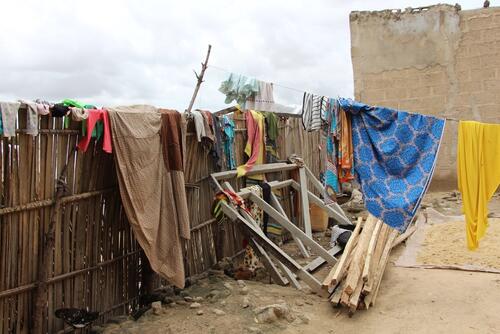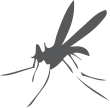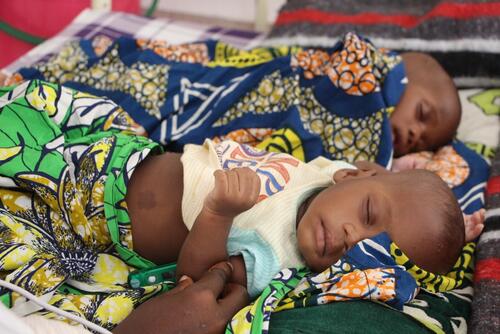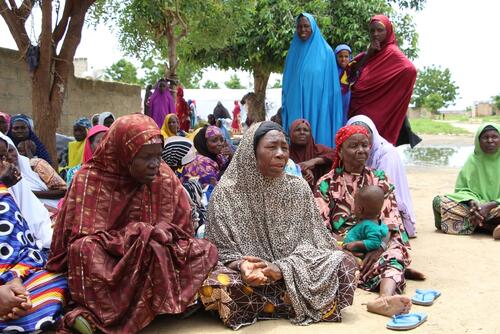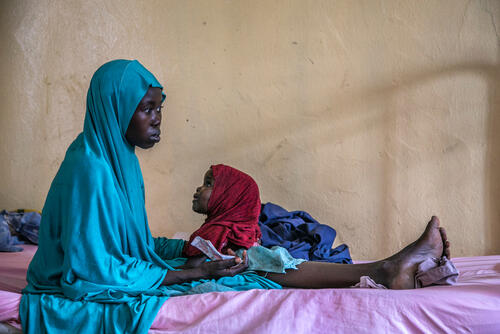A decade of conflict in northeast Nigeria
Fighting between the military and armed opposition groups broke out in northeast Nigeria 10 years ago. Thousands of people have been killed. Others have been deprived of access to medical care and have died of easily treatable disease such as malnutrition and malaria.
It is estimated that about 35,000 people have been killed since 2009, 1.8 million people are internally displaced, and 7.1 million people are in need of humanitarian assistance across the northeastern states of Borno, Adamawa and Yobe.<a href="https://www.humanitarianresponse.info/en/operations/nigeria/infographic/nigeria-humanitarian-dashboard-june-2019">OCHA data</a> Around 230,000 people have fled to the neighbouring countries of Niger, Chad and Cameroon.<a href="https://data2.unhcr.org/en/situations/nigeriasituation">UNHCR</a>
Médecins Sans Frontières (MSF) is currently providing lifesaving medical care in Borno state: in permanent facilities in Maiduguri, Gwoza, Pulka, and through mobile teams in Rann, Bama and Maiduguri.
The crisis is still not over
Borno state is in the grip of a conflict-driven humanitarian crisis and civilians are caught in the middle.
The conflict continues to displace and re-displace people across the state and into neighbouring countries and hundreds of thousands of people remain entirely dependent on humanitarian aid for survival, both in the state capital, Maiduguri, and in isolated enclaves in the countryside controlled by the military.
People are now effectively stranded in these places with little prospect of returning home as long as the conflict continues.
Protracted displacement, violence, abuse, killings, disappearances and imprisonment have had a profound impact on people’s mental health and psychosocial wellbeing. In Pulka, Gwoza, and Ngala, MSF counsellors treat people for depression and anxiety, as well as for post-traumatic stress and psychosomatic disorders.
Trauma is often exacerbated by a perpetual dependency on humanitarian assistance for survival and the precarious conditions in which people are often hosted. Uncertainty over the future, associated with the desire to return home, is an added factor to daily stresses.
Immediate needs are still not being adequately addressed
While international aid has been scaled up, both the quantity and quality of aid delivered is not sufficient. The response started over four years ago, yet crucial gaps remain in healthcare and access to water, shelter and protection. This is exacerbating vulnerabilities and putting already vulnerable families at increased risk. Increased and better coordinated aid, supplies, funding and experienced humanitarian staff are needed throughout Borno state.
Due to restrictions on their movements, most people are unable to farm, fish or sell their goods, leaving them entirely dependent on humanitarian assistance. And yet basic amenities are overstretched, water shortages are common, and sanitation is inadequate.
As a result, some people, especially women and children, resort to harmful coping mechanisms such as survival sex. MSF teams have collected accounts of families returning to the bush as the assistance available in the overcrowded camps is insufficient for survival.
At the end of 2018, we scaled up our activities in Maiduguri to respond to a cholera outbreak declared by the Ministry of Health on 5 September 2018. From September to the end of October, MSF treated close to 8,000 people for cholera.
Since November 2018, we saw the number of children with measles steeply increasing. Our teams treated over 3,000 children with measles in facilities in and outside Maiduguri. They also witnessed a high number of measles cases treated in the various health centres we support.
The high number of cases can be attributed to low vaccination rates across the state, an inadequate routine vaccination programme, and a lack of capacity of local health system and humanitarian organisations to respond to such outbreak.
Protracted displacement, violence, abuse, killings, disappearances and imprisonment also have a profound impact on people’s mental health and psychosocial wellbeing. In Pulka, Gwoza, and Ngala, MSF counsellors treat people for depression and anxiety, as well as for post-traumatic stress and psychosomatic disorders.
Trauma is often exacerbated by a perpetual dependency on humanitarian assistance for survival and the precarious conditions in which people are often hosted. Uncertainty over the future, associated with the desire to return home, is an added factor to daily stresses.
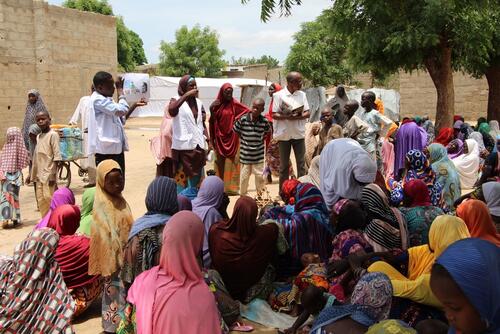
Areas out of reach of assistance
Much of the humanitarian aid is concentrated in Maiduguri, the capital of Borno state, which hosts one million internally displaced people, but services remain insufficient even there. Outside Maiduguri, the ongoing conflict restricts the movements of the population and of humanitarian organisations.
Many people live in areas outside military control, where very little is known about the situation due to access constraints such as ongoing hostilities, threats, impassable roads or restrictions for the movement of staff or goods to certain areas.
The UN estimates that 823,000 people live in these areas, but we have few hard facts about their needs. Newly arriving displaced people report and demonstrate the consequences of being deprived from access to basic assistance. We are deeply concerned about the welfare of these people.
Access to conflict-affected areas and populations must be made a priority. All civilians are entitled to assistance and protection, no matter where they reside.
Safety and dignity: prerequisites to returning home
Despite the ongoing violence and displacement, efforts are being made to return populations to either their places of origin, or to other communities considered viable for returns.
Even though conditions in many towns are far from conducive, we have witnessed large-scale returns of internally displaced people and refugees from Cameroon since 2017. Many have reported to MSF that they felt compelled to leave as the assistance offered in these locations was insufficient for survival.
The voluntary return of displaced people to their homes must be based on reliable information about the situation in their villages and places of origin. Returns should only be offered as a sustainable solution, and only when people can return in safety and with dignity.
To avoid causing further suffering to people, conditions must be conducive for return, and they must be able to live without being fully dependent on humanitarian assistance.
Increased risk of malaria and malnutrition during the rainy season
Entering into the rainy season (July to September), malaria cases are expected to significantly increase. Malnutrition may also reach high levels during this malaria peak, as many children were affected by measles and many of them won’t receive chemo-seasonal prevention treatment.
Moreover, the rainy season will likely cause additional challenges in delivering aid, as remote locations will become even harder to reach.
MSF has started to implement seasonal malaria chemoprevention activities in Pulka, Rann, Banki, Ngala and Bama for over 80,000 children between three months and five years of age.
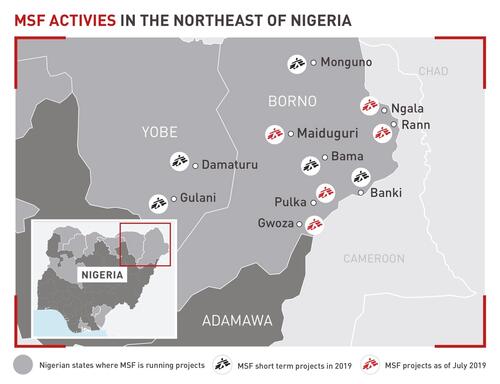
MSF operations in Borno state
Maiduguri, capital of Borno state
In Fori, a southern district of the state capital, Maiduguri, we run an inpatient therapeutic feeding centre with more than 70 beds.
The centre opened in January 2017 and treats severely malnourished children with medical complications such as tuberculosis, cerebral malaria, acute watery diarrhoea and respiratory tract infections.
Severely malnourished children without medical complication and children with moderate acute malnutrition are enrolled in an outpatient feeding programme, which admits 130-300 children each month, and a significant increase in patient numbers is expected during the so-called ‘hunger gap’ between July and September.
In Bolori district, we run mobile clinics to provide basic healthcare, health promotion and water and sanitation activities in five camps for displaced people and has set up a 100-bed cholera treatment centre.
The MSF hospital in Gwange district is the only paediatric facility providing free, dedicated intensive care for a population of approximately 1.8 million people (displaced and host communities) in Maiduguri.
The hospital has 80 beds, with an emergency/observation area, isolation unit and intensive care units. We provide treatment for all kinds of diseases affecting children, the most common being malaria, respiratory tract infections, diarrheal diseases, measles and meningitis. The team treated more than 1,400 children for measles between January and the end of June and has increased its capacity to 210 beds for the seasonal malaria peak.
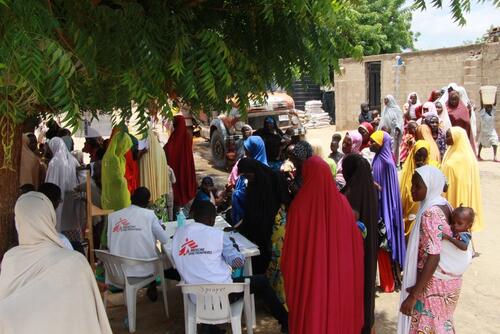
Towns and enclaves in Borno state
We run a 71-bed hospital providing a wide range scale of secondary health services to the local population and displaced people in Gwoza, 135 kilometres southeast of Maiduguri.
Displaced people from northeast Nigeria and neighbouring Cameroon often arrive in Gwoza, a town controlled by the military and surrounded by mountains and the Sambisa forest, where armed groups are believed to be active.
We carry out nutritional and health screenings of new arrivals and provides them with mental health support. Where necessary, our teams also carry out protection activities.
We also provide primary and secondary healthcare, and health screenings for new arrivals, in the town of Pulka, just north of Gwoza.
Pulka hosts more than 40,000 displaced people, some in camps, others living in the host community. The town is completely controlled by the military and people’s movements are limited.
As a result of the unplanned and large-scale movement of people returning from Cameroon, not always voluntarily, there have been severe shortages of food, water and shelter in Pulka.
Some 60 kilometres from Maiduguri, the town of Bama hosts some 29,000 internally displaced people. We have been working there intermittently since 2016 and are currently conducting a short-term malaria prevention and management project, including a 36-bed paediatric facility.
Northeast of Maiduguri, we run a 66-bed inpatient facility in Ngala, which has been under the control of the Nigerian military since February 2015.
Approximately 66,000 internally displaced people (IDPs) live in Ngala IDP camp and within the host community. The military oversees the security of the camp and a token-based system allows people to leave the camp during the day.
Health promotion teams are also active in the community and a 60-bed cholera treatment centre has been set up as a precaution.
Until the end of June 2019, we also ran an emergency room in a Ministry of Health facility in the town of Monguno, where around 30,000 people arrived following violent clashes between the Nigerian government forces and armed opposition groups that erupted in the area at the end of December 2018.
The majority of these newly displaced people were women, children and elderly people, who settled in already overwhelmed camps or on the streets. The needs for shelter, water, sanitation, food and protection were acute.
To tackle the lack of shelter, MSF teams put up 360 shelters for 1,620 people. To improve the provision of water, sanitation and hygiene, 48 latrines and 48 showers were set up, and three water points were built to distribute 70,000 litres per day to 933 households.
We were providing medical care in Rann in January 2017 when the town was bombed, killing 90 people and injuring 150 others. The Nigerian military later claimed responsibility for the bombing, saying it was a mistake. Three staff working for an organisation subcontracted by MSF were among the dead.
On 1 March 2018, an attack on the military base opposite the MSF compound killed a number of Nigerian Armed Forces and NGO workers who were living in the compound. Three female NGO staff were abducted: two have since been executed and one is still missing.
Following further episodes of violence at the beginning of 2019, MSF reduced its activities in Rann and stepped up emergency assistance for people who had fled the town and sought shelter over the border in Cameroon.
Since June 2019, the team back in Rann has been implementing sensitisation activities with community health workers, a surveillance system for potential epidemic diseases, and oral rehydration points. In July, we started providing outpatient treatment for malnutrition, malaria, lower respiratory tract infections and diarrhoea.
MSF operations in Yobe state
Yobe is one of the poorest states in Nigeria. Although it is relatively stable, armed groups are known to be active in the north and south of the state. Healthcare facilities in Yobe are very basic and people have limited access to medical care and health facilities.
For the last two years, we have worked in Yobe State Specialist hospital in Damaturu, the state capital, operating a 25-bed emergency paediatric unit, a 12-bed isolation ward and a 50-bed inpatient therapeutic feeding centre for children under five with severe malnutrition and accompanying health complications. MSF teams also provided care for victims of sexual and gender-based violence and mental healthcare.
As planned, MSF handed over its activities to the Ministry of Health at the end of April 2019. With our mobile emergency team, we continue to monitor the health situation in the state.
MSF’s mobile emergency team
In January 2018, we established a Nigeria Medical Emergency Team (NIMERT) to support our emergency response, not only but in particular in the country’s north.
In 2018, the team assisted health centres in Adamawa to respond to the ongoing conflict between herders and farmers, supported an emergency measles vaccination in Yobe state, and responded to a Lassa fever outbreak by setting up an isolation ward and supporting eight health centres in Ondo state.
The team also responded to cholera outbreaks in several locations in 2018, treating over 1,700 people in Mubi, Adamawa state and 400 in Bade, Yobe state. The team also ran five cholera units in Gulani, Yobe state, and conducted a mass vaccination campaign targeting 125,000 people. In 2019, the second half of the cholera vaccination campaign was conducted in Gulani, targeting almost 150,000 people.



